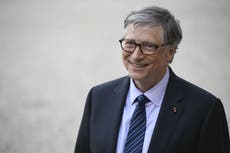Bill Gates says rich countries should only eat beef which is synthetic
The Microsoft founder’s new book offers a guide to tackling the climate crisis, with a focus on tech solutions

Your support helps us to tell the story
From reproductive rights to climate change to Big Tech, The Independent is on the ground when the story is developing. Whether it's investigating the financials of Elon Musk's pro-Trump PAC or producing our latest documentary, 'The A Word', which shines a light on the American women fighting for reproductive rights, we know how important it is to parse out the facts from the messaging.
At such a critical moment in US history, we need reporters on the ground. Your donation allows us to keep sending journalists to speak to both sides of the story.
The Independent is trusted by Americans across the entire political spectrum. And unlike many other quality news outlets, we choose not to lock Americans out of our reporting and analysis with paywalls. We believe quality journalism should be available to everyone, paid for by those who can afford it.
Your support makes all the difference.Bill Gates says that rich countries should only be eating beef which is 100 per cent synthetic in order to tackle the climate crisis.
The Microsoft founder’s new book, How to Avoid a Climate Disaster, was published this week and offers a guide on how to reduce global heating caused by greenhouse gas emissions (GHGs), with a particular focus on tech solutions.
In an interview with MIT Technology Review, the philanthropist acknowledged that tackling emissions from agriculture, in particular livestock, is one of the hardest climate problems to solve and to do so, wealthy nations should look more closely at what’s on their plates.
“I don’t think the poorest 80 countries will be eating synthetic beef. I do think all rich countries should move to 100% synthetic beef,” he said, adding that “the claim is they’re going to make it taste even better over time”.
He said that while he believed the switch from beef to a protein alternative is possible for middle-income and wealthy nations, it would be politically challenging.
“There are all these bills that say it’s got to be called, basically, lab garbage to be sold. They don’t want us to use the beef label,” he said.
When it came to Africa, and poorer countries, “we’ll have to use animal genetics to dramatically raise the amount of beef per emissions for them,” the tech mogul said.
There are around 1.4 billion cattle on the planet, making up the second-largest source of agricultural greenhouse gas emissions (GHGs) after food waste.
Cow farts, and more importantly cow belches, release methane, a powerful GHG. In the first two decades after its release, methane is 84 times more potent than carbon dioxide, according to the Environmental Defense Fund.
Along with other grazing animals, cattle make up about 40 per cent of the annual global methane budget, according to the UN’s Food and Agriculture Organization.
Mr Gates said that while there’s innovations in feed that will lead to cows producing less methane, it won’t be a significant enough reduction.
He told the college publication: “I’m afraid the synthetic [protein alternatives like plant-based burgers] will be required for at least the beef thing.”
The billionaire, who leads the Bill and Melinda Gates Foundation with his wife, is also chair of the investment fund Breakthrough Energy Ventures. He is personally invested in a start-up called Memphis Meats which makes lab-grown meat and has backed Beyond Meat and Impossible Foods, which he says “have a road map, a quality road map and a cost road map, that makes them totally competitive”.
He noted that while there was a long road to go in terms of scale as “they don’t represent 1% of the meat in the world”, he was more optimistic about revolutionizing the agricultural sector now than five years ago.



Join our commenting forum
Join thought-provoking conversations, follow other Independent readers and see their replies
Comments